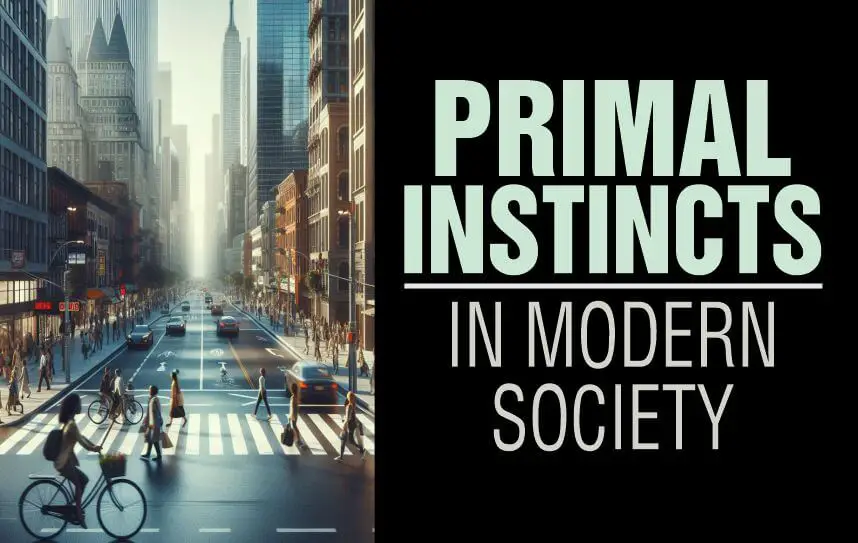Last updated on January 18th, 2024 at 11:09 am
Explore the role of primal instincts in modern society and their impact on decision-making, relationships, and the workplace.
Amid our fast-paced, technologically advanced world, it is easy to forget that we humans are not so dissimilar from our primal ancestors.
Deep within us, beneath the layers of modernity, lie our primal instincts.
These inherent traits, formed over millions of years of evolution, have shaped our survival strategies, emotions, and social interactions.
In this article, we will explore the relevance of these primal instincts in modern society and reflect on how embracing them can lead to a more harmonious and fulfilling existence.
Table of Contents
- Primal Instincts in Modern Society
- The Role of Primal Instincts in Our Survival in the Workplace
- Harnessing Primal Instincts for Success and Personal Growth
- Frequently Asked Questions
- Conclusion
Primal Instincts in Modern Society

Primal instincts refer to the innate behaviours and impulses that humans and animals possess, which are rooted in our evolutionary history.
In modern society, these instincts continue to influence our thoughts, behaviours, and decision-making processes.
For example, the fight-or-flight response is a primal instinct that helps us react to dangerous situations.
Similarly, our instincts for survival and reproduction impact our desires for safety, food, and sex.
While modern advancements may have mitigated certain survival challenges, primal instincts still play a role in our lives, albeit in more subtle ways, shaping our relationships, career choices, and consumer behaviours in the modern world.
Related: Why You Should Trust Your Instincts In Relationships
The Role of Primal Instincts in Our Survival in the Workplace

As humans, it is ingrained in us to crave competition and social hierarchies.
These instincts are rooted in our biology and have been essential for our survival and evolution.
In the workplace, these instincts can play a significant role in the way we interact with our colleagues and affect our professional lives.
1. Instinctive Competition
Competition is an instinct that can motivate us to strive for excellence. It is a natural drive that can push us to work harder and achieve more significant results.
In the workplace, competition can manifest in several ways.
For example, employees may compete for promotions or recognition, which drives them to put in extra effort and deliver high-quality work.
However, the downside of competition is that it can also create a toxic work environment if employees become cut-throat and sabotage each other.
Related: Instinctual Motivation: How Instincts Drive Desire For Status
2. Social Hierarchies
Primal instincts influence social hierarchies in the workplace and modern society in various ways.
One such instinct is the drive for dominance and status, which can manifest in the form of competition for leadership positions and influence within a group or organization.
This can lead to the establishment of hierarchies based on power and authority.
Additionally, the instinct for cooperation and social connection can influence the formation of alliances and networks within the workplace and society.
Individuals may form social bonds with those who share similar goals and values, creating social hierarchies based on mutual support and collaboration.
Moreover, the instinct for social comparison and the desire for recognition can impact social hierarchies, as individuals seek validation and status through their achievements and contributions.
This can lead to the development of hierarchies based on merit and accomplishment.
Furthermore, the instinct for fairness and justice can influence social hierarchies by shaping attitudes towards equality and the distribution of resources within a group or society.
This can impact the establishment of hierarchies based on principles of fairness and equity.
Related: What Are The 5 Basic Human Instincts?
3. Finding Mates

Our innate desire for reproduction drives us to seek partners with qualities indicating they’d be good providers and partners, including physical attributes and personality traits.
It’s not just about reproduction; we seek partners who can help us survive in various ways, such as through social status or physical strength.
After finding a mate, forming social bonds becomes crucial for survival, as we need social support to navigate life’s challenges.
Primal instincts drive us to form bonds with those similar to us in values, beliefs, and goals.
Related: How To Trigger A Man’s Hero Instincts To Do More
4. Nurturing Family Connections
Nurturing family connections is crucial for survival, driven by primal instincts to protect and care for offspring.
This involves providing food, shelter, emotional support, and teaching life skills.
Despite primal instincts, conscious choices play a role in valuing qualities beyond survival, forming social bonds with diverse individuals, and broadening perspectives.
Relationship survival involves balancing primal instincts and conscious choices.
Recognizing the role of instincts in decisions can lead to greater understanding and empathy in relationships, ultimately leading to a more fulfilling life.
Related: Emotional Intelligence vs Primal Instincts
Harnessing Primal Instincts for Success and Personal Growth
Harnessing primal instincts for success involves understanding and channeling our innate drives in a purposeful and directed manner.
By tapping into these primal instincts, we can unlock tremendous potential and achieve greater levels of success.
Here are some areas primal instincts can be harnessed for success:
1. Utilizing Primal Instincts in Sports for Peak Performance
Utilizing primal instincts in sports can unleash energy, focus, and determination, leading to peak performance.
Athletes tapping into their primal instincts can reach new heights of excellence.
The fight-or-flight response can be channeled to elevate performance during high-pressure situations, using adrenaline to sharpen focus and react swiftly.
Embracing the competitive nature within can fuel peak performance, driving athletes to push harder and consistently seek improvement.
The instinct for teamwork and cooperation enhances performance in team sports, fostering camaraderie and trust.
Additionally, the instinctual drive for survival can develop mental resilience, helping athletes overcome challenges.
Understanding and harnessing these instincts allows athletes to achieve extraordinary success in sports.
Related: Dangers of Suppressing your Instincts
2. Primal Instincts to Personal Growth and Development
Applying primal instincts to personal growth involves harnessing innate drives for transformative change.
By recognizing the drive for self-preservation, we prioritize physical, mental, and emotional health through practices like exercise and stress management, promoting resilience.
The drive for curiosity and exploration fuels personal development by encouraging us to seek new experiences and perspectives.
Social connection and cooperation are vital for growth, providing a support system for learning and development.
Additionally, the drive for adaptation and resilience allows us to navigate change and overcome obstacles, promoting the capacity to thrive in adversity.
Consciously applying these instincts unlocks motivation, resilience, and self-discovery, paving the way for transformative growth and meaningful life.
Related: Why You Should Not Suppress Your Instincts
3. Enhancing Decision-making Through Primal Instincts
Enhancing decision-making through primal instincts involves tapping into innate drives to inform and guide choices, making decisions more intuitive and effective.
The fight-or-flight response serves as an early warning system, aiding in split-second decisions during high-pressure situations.
The drive for survival helps assess risks and prioritize well-being, aligning decisions with fundamental needs.
Social connection and cooperation provide diverse perspectives, while exploration and curiosity inspire unconventional approaches.
Integrating primal instincts taps into wisdom and intuition for favorable outcomes.
Frequently Asked Questions
Does our primitive survival instinct still work in the 21st century?
Yes, our primitive survival instinct still operates in the 21st century, influencing decision-making, risk assessment, and social interactions in modern life.
How do primal instincts influence decision-making in modern society?
Primal instincts inform split-second decisions, risk assessment, and social cooperation, shaping choices in high-pressure situations and social interactions.
Can primal instincts impact social relationships in modern society?
Yes, they influence social hierarchies, cooperation, and competition, shaping alliances, leadership dynamics, and the pursuit of status and recognition.
Do primal instincts play a role in workplace dynamics?
They influence leadership competition, social alliances, and the pursuit of recognition and fairness, shaping workplace hierarchies and interactions.
How do primal instincts affect personal development in modern society?
Primal instincts drive self-preservation, curiosity, and social connection, influencing resilience, personal growth, and decision-making in contemporary life.
Conclusion
Exploring the primal instincts in modern society unveils an understanding of our human nature and offers valuable insights into our behaviours, decision-making processes, and interactions.
While our world has drastically evolved, our primal instincts continue to shape our lives, albeit in different forms.
Recognizing and harnessing these instincts can empower us to navigate the complexities of the modern world with greater self-awareness and effectiveness.
References:
- Does Our Primitive Survival Instinct Still Work in the 21st Century?
- Exploration of survival instinct through symbolism
- Making space for the primal nature of kids
- https://www.nature.com/scitable/knowledge/library/overview-of-hominin-evolution-89010983/
Pious Clements is the insightful voice behind "The Conducts of Life" blog, where he writes about life ethics, self-development, life mastery, and the dynamics of people and society.
With a profound understanding of human behaviuor and societal dynamics, Pious offers thought-provoking perspectives on ethical living and personal growth.
Through engaging narratives and astute observations, he inspires readers to navigate life's complexities with wisdom and integrity, encouraging a deeper understanding of the human experience and our place within society.

